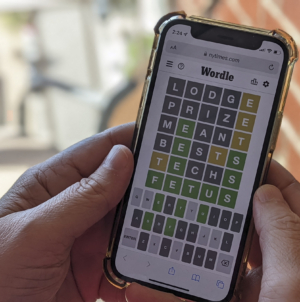-
‘Wordle’ Today #1,252 Answer, Hints and Clues for Friday, November 22 - 14 mins ago
-
The UK Faces a Dilemma: Cozy Up to Trump or Reconnect With Europe? - 41 mins ago
-
NYT ‘Connections’ November 22: Clues and Answers for Game #530 - 49 mins ago
-
Bob Casey Concedes to David McCormick in Pennsylvania Senate Race - about 1 hour ago
-
Police in New Jersey’s Capital Violate Residents’ Rights, U.S. Finds - about 1 hour ago
-
Steelers WR Van Jefferson Questionable to Return With Significant Leg Injury - 2 hours ago
-
Pam Bondi Is Trump’s New Choice as Attorney General. Here’s What to Know About Her. - 2 hours ago
-
Newsom touts his economic plans in California’s conservative regions - 2 hours ago
-
Trump Won’t Care that RFK Jr. Compared Him to Hitler, Ex-Aide Says - 3 hours ago
-
N.Y.C. Housing Plan Moves Forward With an Unexpected $5 Billion Boost - 3 hours ago
Growing Number of Americans Believe AI Will Negatively Impact Jobs Market
As artificial intelligence (AI) becomes an ever more pervasive technology, two recent polls have indicated that the number of Americans fearful of its impact on the U.S. jobs market is increasing.
A YouGov study published on Wednesday found that more Americans expected AI advances to decrease the number of available jobs in their industry this year than said so last year.
In March 2023, 29 percent of 2,000 U.S. adult respondents said they believe AI would reduce the number of jobs in their industry – a figure which spiked to 41 percent in a July survey that year.
In 2024, another YouGov survey in March found that 43 percent of 1,066 respondents held these fears, and in August half (48 percent) of 1,098 said they believed AI would negatively impact the jobs market in their profession.
YouGov’s report also said that whilst many Americans were wary of an overall decrease in the number of jobs available due to the rise of AI, most were not fearful they would lose their job as a result of the technology’s propagation.
Separate research published the same day by Gallup found that a staggering three quarters of respondents said AI would reduce the total number of jobs in the next 10 years. Gallup received the same response in 2023, according to the report.
Gallup’s research also found a lack of trust in businesses to responsibly use the technology. Just 23 percent said they had some degree of confidence.

Spencer Platt/Getty Images
Newsweek spoke with Peter Bentley, lecturer in computer science at University College London, who likened the rise of AI to the dawn of the internet.
“You could argue that the change in our shopping habits resulted in massive job losses as high street stores disappeared and were replaced by online retailers. But equally, vast numbers of new jobs were created to run new online businesses. The same is likely to be true of AI,” said Bentley, author of Artificial Intelligence in Byte Sized Chunks.
“Some roles will become obsolete as they are easily automated by AI. But new kinds of businesses and roles will appear, generated by the new AI technologies.”
“The biggest dangers we face with AI is trusting it too much. AI is astonishing, but it’s not ready for safety-critical applications. It can be tremendously useful to assist our doctors, teachers, managers, designers, artists, drivers and a whole host of other roles. But AI today is a fuzzy reflection of us and our societies. Even the best AIs will sometimes make silly mistakes and will sometimes behave inappropriately,” Bentley added.

Lintao Zhang
As an increasing number of industries seek to integrate with AI, Newsweek spoke with another expert in June to examine which fields could be at risk from AI-driven shake-ups.
Among the potentially affected roles were analysts, bookkeepers, customer service representatives, media content creators, legal assistants, and paralegals.
“When thinking about the implications for specific jobs, these tools are more likely to replace tasks than jobs, which may mean that you need fewer people to do the work or it could mean that more people are needed because the productivity is much higher with all the low value work is being done by machines,” Carter Price, senior mathematician at the RAND Corporation think tank, previously told Newsweek.
Do you have a story we should be covering? Do you have any questions about artificial intelligence or the U.S. jobs market? Contact LiveNews@newsweek.com
Source link





















